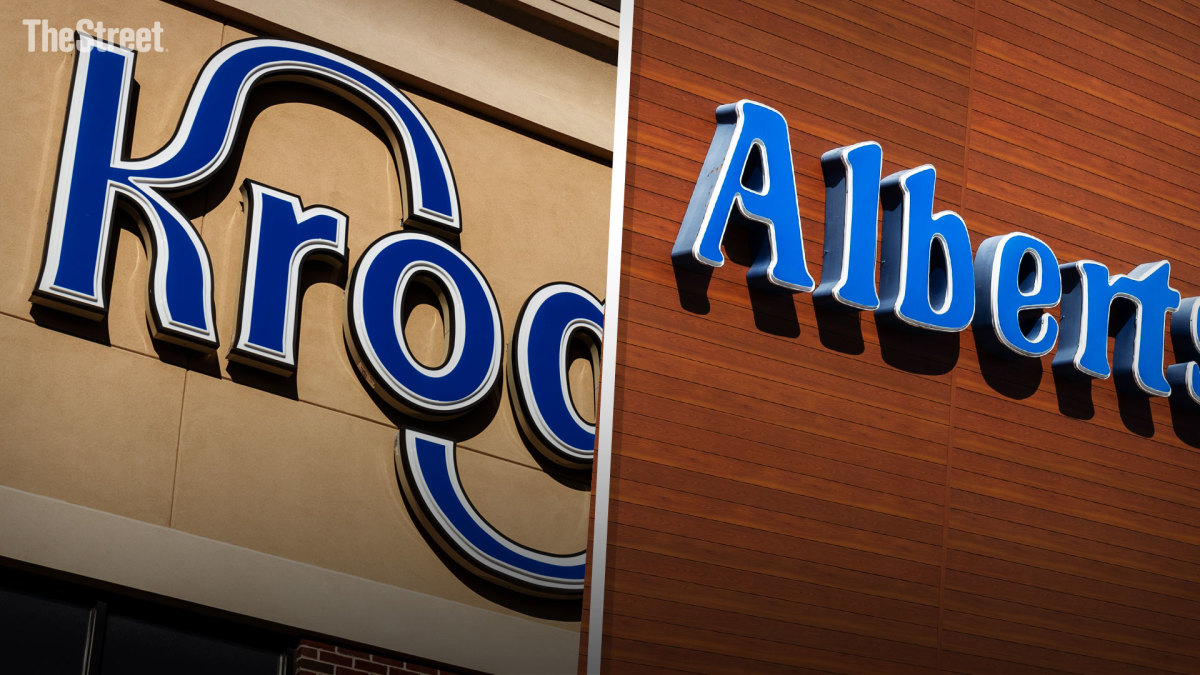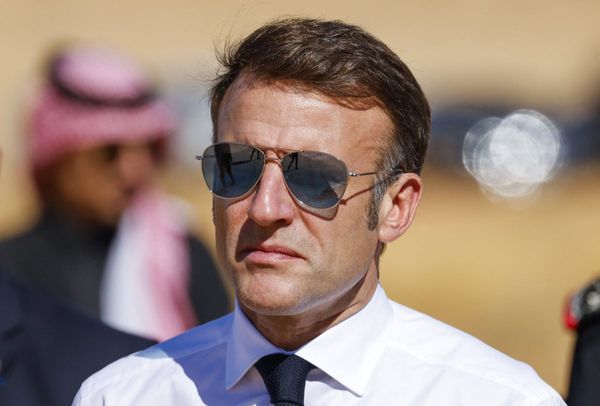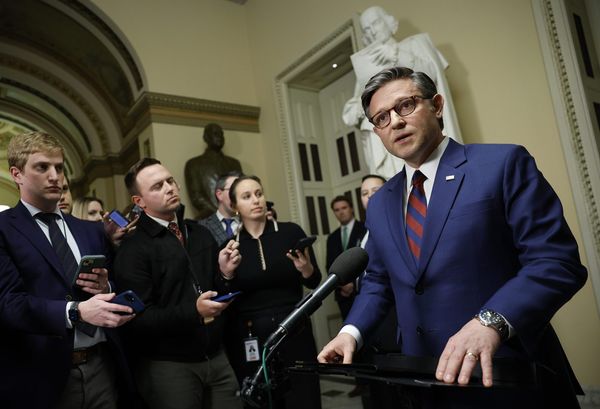
Well, it sounded like a great idea two years ago.
Back in 2022, grocery chains Kroger (KR) and Albertsons announced an agreement to establish "a national footprint to serve America with fresh, affordable food for everyone."
Related: Analysts revamp Amazon stock price target after AWS AI update
There was talk of synergies and creating "a premier seamless ecosystem across 48 states and the District of Columbia."
The deal, valued at $24.6 billion, would’ve been the largest grocery store merger in U.S. history.
During Kroger's third-quarter-earnings call on Dec. 5, W. Rodney McMullen, chairman and chief executive, was still high on the agreement. Sort of.
💰💸 Don’t miss the move: SIGN UP for TheStreet’s FREE Daily newsletter 💰💸
"It is exciting to see the complementary strengths of both Kroger and Albertsons organizations," McMullen told analysts. "And we look forward to combining these strengths to provide customers with an even better experience."
The Federal Trade Commission was less excited. It had sued to block the merger, saying in February that "Kroger’s acquisition of Albertsons would lead to additional grocery price hikes for everyday goods, further exacerbating the financial strain consumers across the country face today.”
McMullen told analysts that Kroger remained "confident in the facts and the strengths of our position."
"Regardless of the outcome of the trials, Kroger is operating from a position of strength," he said. "And we are optimistic about our future."
If the deal were to go south, McMullen said, "I don't know that we would be out there trying to find what's the next Albertsons."
"We've always made sure that we don't need to do mergers to make our business successful," he added.
Albertsons files lawsuit against Kroger
Those words will be tested after the merger proposal was ruled "no sale" by two different judges.
Related: Chipotle's menu-price changes reset outlooks
U.S. District Court Judge Adrienne Nelson issued a preliminary injunction blocking the merger on Dec. 10 after a three-week hearing in Portland, Ore.
Nelson said in her ruling that supermarkets were “distinct from other grocery retailers” and were not direct competitors to Walmart (WMT) , Amazon (AMZN) and other companies that sell a wider range of goods.
The merger would eliminate head-to-head competition between Albertsons and Kroger, potentially raising prices for consumers, Nelson said.
Later that same day, Judge Marshall Ferguson in Seattle issued a permanent injunction barring the merger in Washington after concluding it would lessen competition in the state and violate the state's consumer-protection laws.
Following the decisions, Albertsons called off the deal, with CEO Vivek Sankaran saying in a statement that "given the recent federal and state court decisions to block our proposed merger with Kroger, we have made the difficult decision to terminate the merger agreement."
Albertsons promptly filed a lawsuit alleging that Kroger didn’t do enough to secure regulatory approval for the deal.
“Rather than fulfill its contractual obligations to ensure that the merger succeeded, Kroger acted in its own financial self-interest, repeatedly providing insufficient divestiture proposals that ignored regulators’ concerns,” Tom Moriarty, Albertsons’s general counsel, said, according to The Wall Street Journal.
Albertsons said that Kroger repeatedly refused to divest the assets necessary to gain antitrust approval, ignored regulators' feedback, rejected stronger divestiture buyers and failed to cooperate with Albertsons.
The lawsuit, filed in Delaware Chancery Court, seeks billions of dollars in damages from Kroger.
A Kroger spokeswoman said Albertsons’ claims are baseless and without merit.
Kroger said that Albertsons repeatedly breached the merger agreement during the deal process and that the suit was an attempt to deflect responsibility and to seek payment of the merger’s breakup fee. Kroger said Albertsons isn’t entitled to that fee.
Meanwhile, Albertsons’ board approved a share buyback of as much as $2 billion, including the current authorization.
The board also said it intended to increase its quarterly cash dividend 25% to 15 cents a share from 12 cents. The company expects the higher payout to take effect beginning with the next quarterly dividend declaration.
Cerberus Capital Management, Albertsons' largest shareholder, said it was sticking with the company, saying in a statement that “while we are disappointed with the courts' decisions, we remain confident in Albertsons' strength as a stand-alone company, and we believe that it is significantly undervalued in its current trading range.”
Analyst: Kroger will likely buy back shares
The private-equity firm, which initially invested in Albertsons in 2006 and made additional investments in 2013 and 2015, said that it was “proud of the company's performance and it will continue to be a strong supporter of Albertsons, its talented leadership team, and its dedicated associates.”
Investment firms issued research notes about the companies following the failed merger deal.
More Retail Stocks:
- Walmart cuts back controversial policies after blowback
- Gap flags new trend that threatens activewear rivals
- Best Buy flags an alarming shift in consumer behavior
RBC Capital lowered its price target on Albertsons to $21 from $22 and affirmed an outperform rating on the shares.
Investors largely expected the courts to block the merger, though the investment firm's estimate of earnings before interest, taxes, depreciation and amortization is below the Wall Street consensus.
Potential catalysts for Albertsons include the share-buyback commitment and/or a sale-and-leaseback deal, RBC Capital added.
On Wednesday, Kroger did exactly that, announcing a $7.5 billion share repurchase plan. The buyback replaces an existing $1 billion repurchase program from 2022. It also includes an accelerated $5 billion repurchase.
JP Morgan analyst Ken Goldman found the federal judge's injunction against Kroger's proposed buyout of Albertsons to be "comprehensively in favor" of the Federal Trade Commission.
The analyst said he was hard-pressed to see Kroger continuing with the transaction in its current form unless the company thought an appeal was likely to succeed.
Kroger is more likely to "stand down," pay the $600 million breakup fee to Albertsons, and move forward.
While Kroger might pursue smaller acquisitions, it'll use much of the cash on its balance sheet to buy back shares, JP Morgan's Goldman said, according to The Fly.
Morgan Stanley slashed its price target on Albertsons to $19 from $24 and kept an equal weight (effectively neutral) rating on the shares.
While Kroger is “taking time to react” to the judgments to block the planned Albertsons deal and considering its options, management indicated in July investor meetings it would not likely appeal any rulings.
That would mean the blocked deal stands and each company moves separately, the firm said.
For Kroger, the immediate future will likely include a share buyback, but the paths for both stocks will depend on inflation, comparisons and profit growth, Morgan Stanley said.
These metrics are "decent" for Kroger and "lackluster" for Albertsons, Morgan Stanley said.
Related: Veteran fund manager delivers alarming S&P 500 forecast







